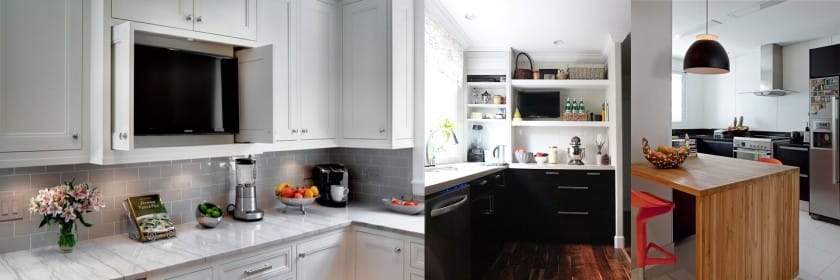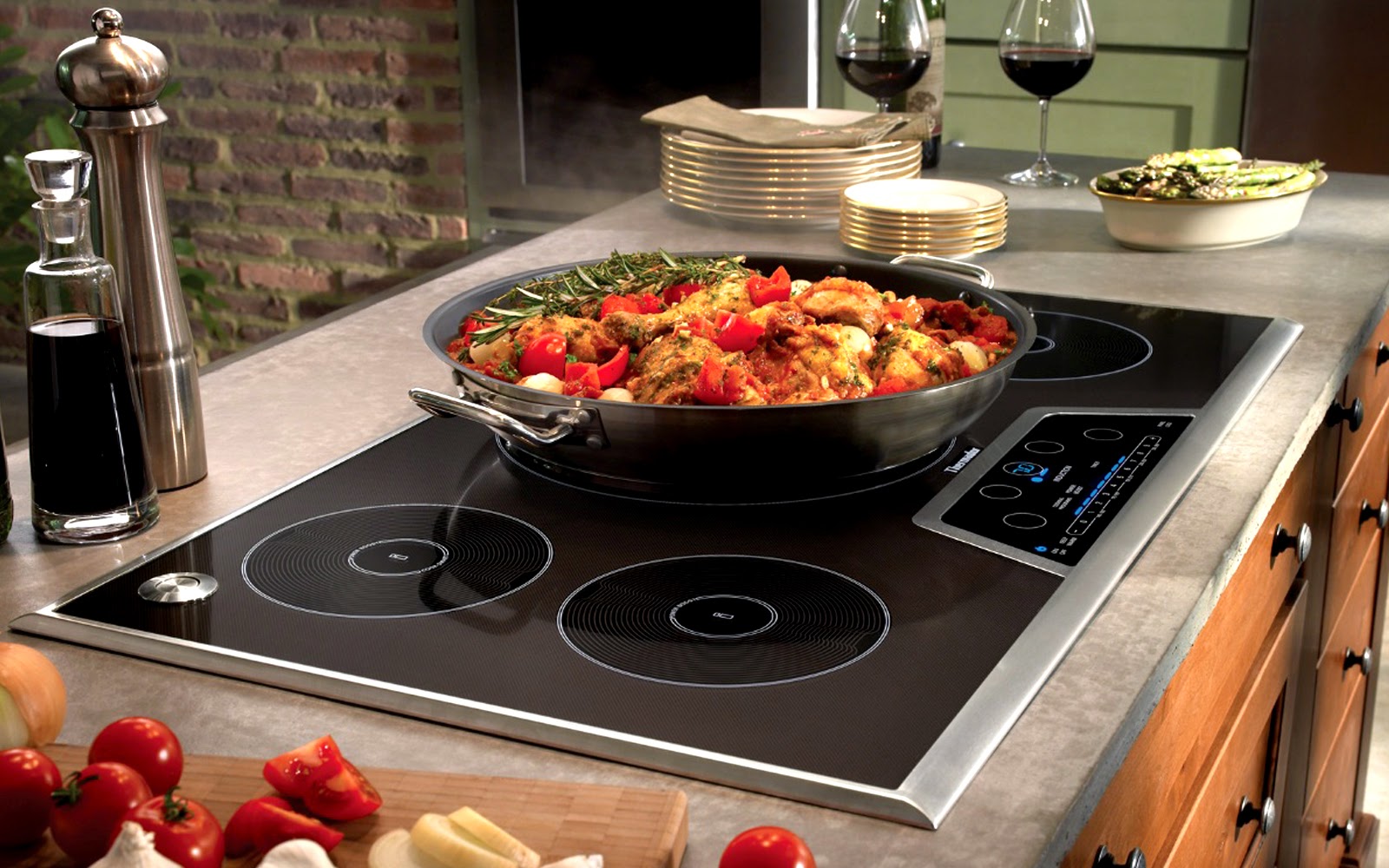Rating of the best single-board microcomputers for 2022
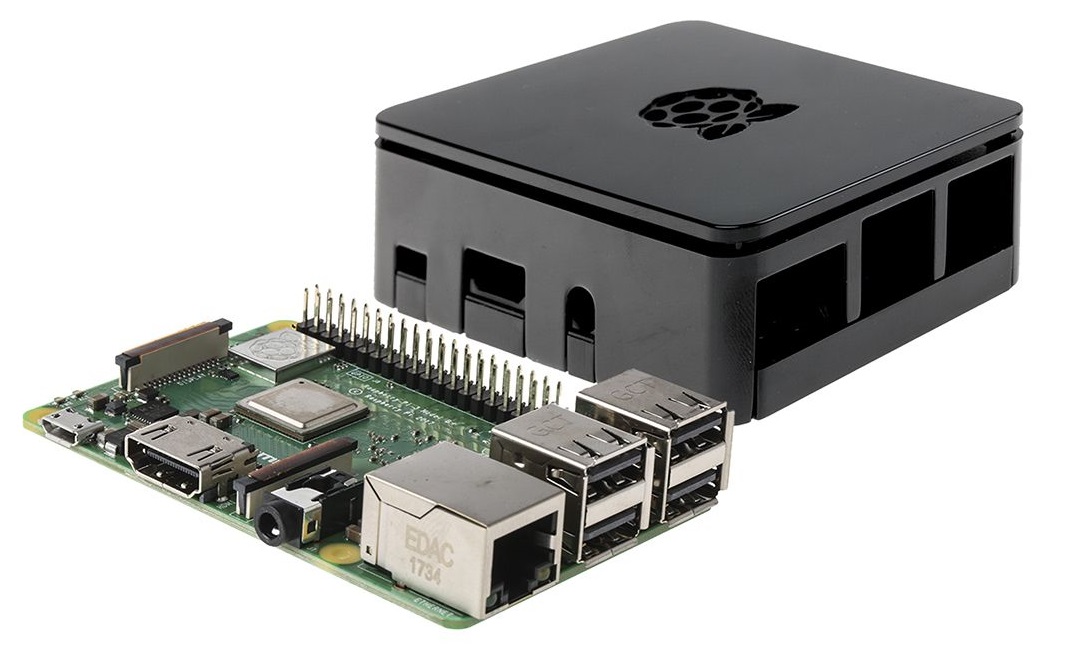
Recently, single-board computers have become increasingly popular in the world of electronics. Despite the fact that they were invented a long time ago, many still do not know what kind of device it is and what it is for. The very name of the device suggests that it consists of several modules that are assembled on one card. Elements of the system can be sold assembled, or as part of individual elements.
The internal structure of the mini-PC is similar to the older "brother". The following components are usually installed on the motherboard: microprocessor, RAM, data input and output connectors, and other elements. Separately, various sensors (temperature, illumination), a screen for displaying information, etc. can be installed.Such computer equipment does not have high performance, however, due to its compact size and low power consumption, it has a wide range of applications - they can be used as a small home audio studio, as a transmission device for peering, and also as a game console (for this you will have to make an emulator, such The technique is applicable only to old games).
In this review, we will find out what microcomputers are, get acquainted with the principle of their operation, and also tell you what to look for when buying in order not to make mistakes when choosing.
Content
Functional
Encountering a Windows mini PC is no easy task. Most of them are based on Android or Linux. Basically, standard devices consist of CPU, GPU, components, as well as interfaces (network, USB). Power is supplied from the USB output, the average current strength is 1000 mA. As a rule, standard blocks are used for power supply, which are used to charge mobile devices from the network, or using power banks. Mini-computers have a universal purpose, the main difference from the "big brothers" is a different architecture.
Fortunately, in recent years, an increasing number of applications allow them to be used in conjunction with microcomputers. Despite their compact size, single-board devices practically do not differ in the level of automation; the user only needs to perform a series of sequential actions in order to configure the device. Thanks to the development of computer technology, developers began to release software that does not require a router to interact with various devices, which allows them to be assembled directly.
Data transfer between devices is carried out through the use of GPIO ports, which are easy to interact using "on-off" technology.
Despite their versatility, minicomputers are not for everyone. So, it is irrational to use popular models for mining - with all diligence, one device will not be able to earn more than $ 1 per day, which is associated with functional limitations on the calculation speed. This is not profitable, given that a mini-computer consumes electricity in approximately comparable amounts during operation. The device is also not suitable for those who have never dealt with the Linux operating system, since setting up work parameters requires additional knowledge (you need to know the basics of programming, circuits and architecture). Without the necessary programming skills, the effective use of equipment is impossible, and the purchase is irrational. However, for lovers of circuitry, the purchase of a single-board computer will allow not only to discover mini-technology, but also to be realized in development.
Rating of high-quality single-board microcomputers
Budget (up to 5,000 rubles)
Onion omega 2+
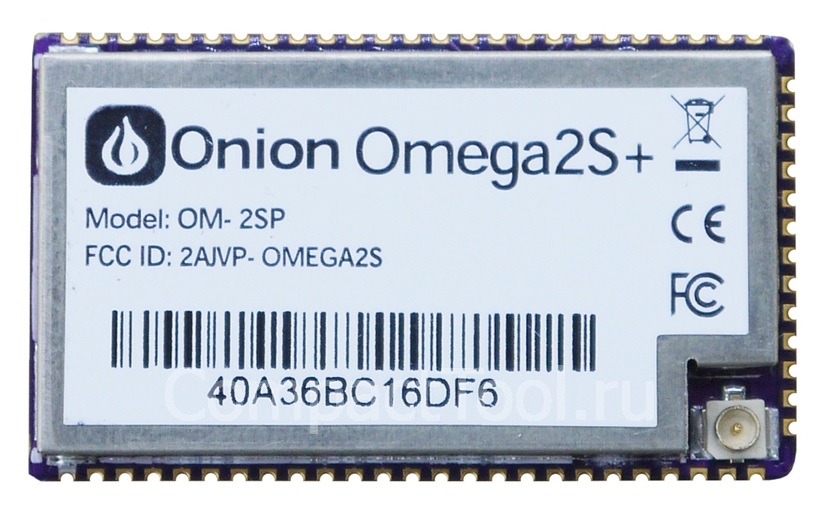
The model is one of the most budgetary in its category.It is a continuation of the user-favorite omega 2. The processor has a power of 580 MHz. The operating system is Linux, or rather its light version LEDE. The device is positioned by the manufacturer as the world's most compact single-board microcomputer. Some users believe that the model combines the advantages of two products - the versatility of the Arduino and the performance of the Raspberry Pi.
The chip in the device is single-core (MediaTek MT7688), characterized by low power consumption. It supports wireless data transmission via the Wi-fi module (there is a built-in antenna, and a connector for connecting an external one), and is also equipped with two memory blocks (operational - 16 MB, flash - 64 MB). You can order a mini PC online at any specialized online store, including Amazon. For the convenience of the user, the board has an LED that shows the status of the device (on, off, loading). There is also a slot for a memory card, which allows you to increase its volume several times. The average price of a product is 1 thousand rubles
Specifications:
| Index | Meaning |
|---|---|
| CPU | MT7688 |
| Clock frequency | 568 MHz |
| RAM memory | 64 MB |
| Flash memory | 16 MB |
| USB | 2.0 |
| WiFi | 2.4GHz b/g/n |
| Rated operating voltage | 3.3 V |
| Total I/O ports | 18 |
| Hardware interfaces SPI | 1 |
| Hardware interfaces I²C / TWI | 1 |
| Hardware interfaces UART / Serial | 2 |
- the product is inexpensive;
- there is a Wi-fi module;
- low power consumption;
- compact dimensions.
- low processor power.
Orange Pi Zero
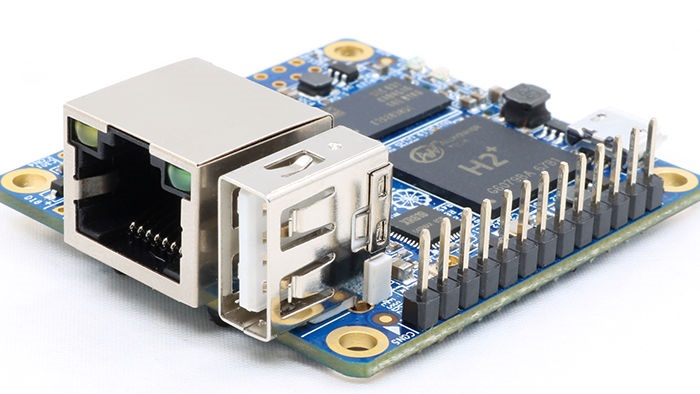
The review continues with the well-known model, which does not have high performance, but has a compact size and low power consumption.A Chinese-made product is notable for its low cost, like other goods from the Middle Kingdom. The modification is considered one of the most famous in its class due to its good price / quality ratio.
The board has two GPIO ports - 13 and 26 pins. The first is used for the Interface Board, the second for custom elements. Like other products from China, the cheapest way to order a mini PC is on the well-known website Ali Express. The package bundle of the device is comparable to the well-known model Raspberry Pi 3. Most often, buyers order the board together with the Interface Board, as well as a plastic case. The microcomputer has a Wi-fi module, USB 2.0, and an Ethernet interface.
There is no HDMI, and to connect the board to a TV, you will need to purchase an additional adapter (the so-called "tulips" are not suitable for a modern TV). The power consumption of the model does not exceed 300 ohms. Users note that the device is very hot, and for active work it is recommended to install additional radiators. The computer can work with several operating systems: Android, Lubuntu, Debian, Raspbian. The main scope of using the device is listening to music, watching videos, playing games, print server, IP camera, smart home server, etc. There are two LED indicators - power and status. The average price of a product is 2,400 rubles.
Specifications:
| Index | Meaning |
|---|---|
| CPU | quad core Cortex A7 |
| Clock frequency | 1.2 GHz |
| RAM memory | 512 MB |
| Flash memory | 64 MB |
| USB | 2.0 |
| WiFi | WIFI-XR819 |
| Rated operating voltage | 5 V |
| Bluetooth | No |
| IR port | there is |
| Physical buttons | missing |
| dimensions | 46*48*18mm |
- compact dimensions;
- low cost;
- low power consumption;
- easy to find on sale, you can order with Ali Express.
- poor performance.
FriendlyElec NanoPi NEO3
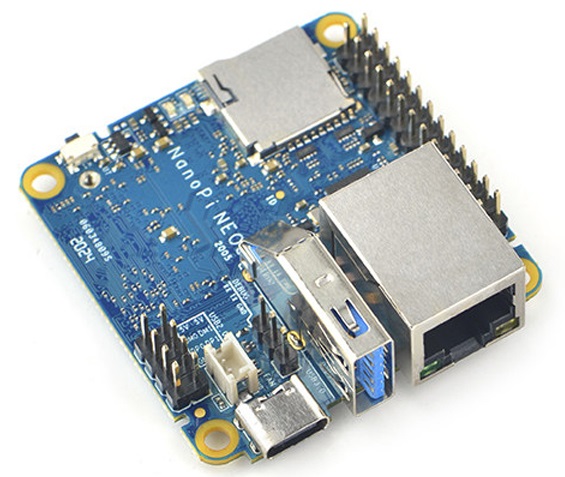
The developers of the model claim that it is a budget alternative to the pioneer in the field of single-board microcomputers - Raspberry Pi 3. You can find 2 modifications on sale - with 1 or 2 GB of RAM. The board is sold in a plastic case, and assembled, which compares favorably with competitors. The manufacturer claims the presence of Ethernet and USB 3.0 interfaces. Power is supplied via the USB Type-C connector. There is a slot for a flash card, as well as an LED to inform the user about the status of the device.
Since the processor of the device heats up during operation, a cooling radiator is preinstalled in the case. For the same purpose, ventilation holes are provided on the case. The main purpose of the model is the organization of network storages. Users note good performance of the quad-core processor, which can perform most of the standard tasks. The device is capable of operating at temperatures from -20º to +70ºС. The overall dimensions of the mini-PC are 48 × 48 mm, and the weight is 22 grams. The device runs on FriendlyWrt 19.07, Ubuntu, Linux-5.4 operating systems. The average price of a product is 3,500 rubles.
Specifications:
| Index | Meaning |
|---|---|
| CPU | Rockchip RK3328 quad-core 64-bit |
| Clock frequency | 1.4GHz |
| RAM memory | 1 GB |
| Flash memory | 128 GB |
| USB | type-A 3.0 |
| WiFi | No |
| Rated operating voltage | 5 V |
| Bluetooth | No |
| IR port | No |
| Fan connector | there is |
| Status indicators | Red Green |
| User Key | 1 PC. |
| Physical buttons | missing |
| dimensions | 54 x 54 x 38 mm |
- high performance;
- budget price;
- a large number of connectors;
- quad-core processor.
- no wifi, no bluetooth.
Arduino mega 2560 r3
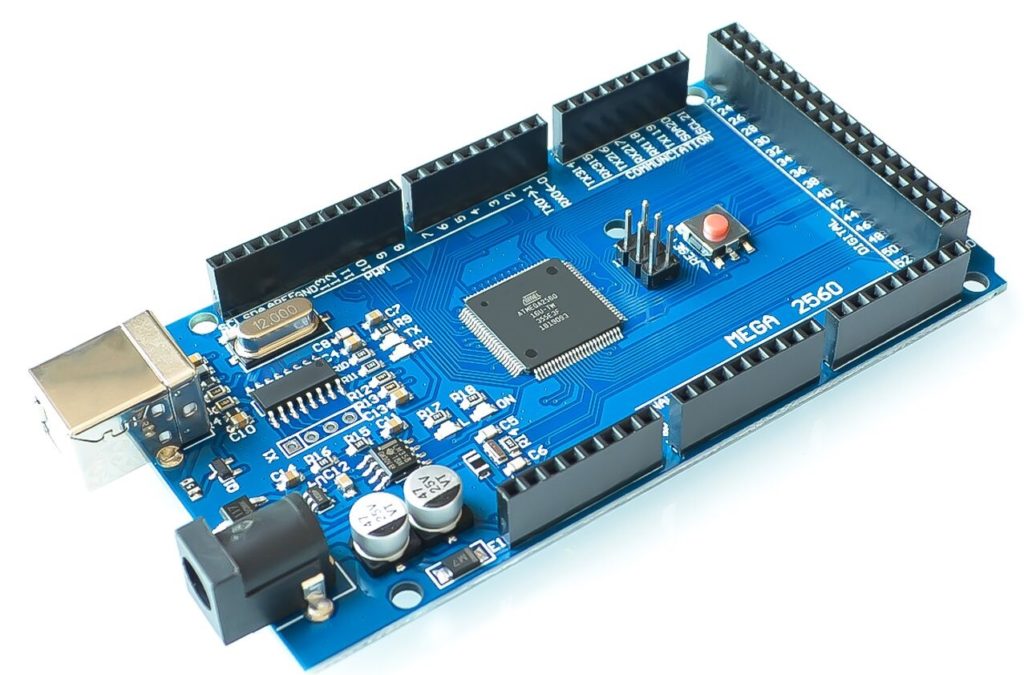
The main advantages of the model, as well as all brand products, are a large number of programmable inputs and outputs (54 pieces), as well as the presence of a USB connection. The brand's products are produced in the USA, Italy, and China (the largest share). The board itself is made of fiberglass, all elements are soldered neatly, without defects (as is often the case with Chinese products). Compared with microcomputers from other companies, this one is large (101.6*53mm). There is HDMI 1.4.
Among the features of a mini-PC, users note a powerful chip. Power is supplied either from the 2.1 connector or via the USB interface. Among the reviews, you can find the opinion that the board must be powered at least 7 V, otherwise interruptions in operation are possible (despite the fact that the manufacturer indicates a minimum value of 5 V). Most often, a microcomputer is used as a server for a cloud or Internet pages. For example, it can be used to control an automated boiler room, a smart home system, as a weather station, and other projects.
The manufacturer has provided the possibility of creating a server based on a micro-PC. This will require the board itself, a memory card, and an Ethernet shield. The average price of a product is 5,000 rubles.
Specifications:
| Index | Meaning |
|---|---|
| CPU | ATmega2560 |
| Clock frequency | 16 MHz |
| Flash memory | 256 kb |
| USB | 2.0 |
| WiFi | No |
| Rated operating voltage | 5 V |
| SRAM memory | 8KV |
| EEPROM memory | 4KV |
| Digital I/O | 54 lines |
| Analog inputs | 16 |
| Recommended voltage | 7-12V |
| Physical buttons | missing |
| dimensions | 100*53*15 |
- powerful processor;
- high-quality manufacturing materials;
- low power consumption;
- wide functionality.
- there is no cooling system.
Average price category (from 5 to 10 thousand rubles)
Raspberry Pi 4 Model B
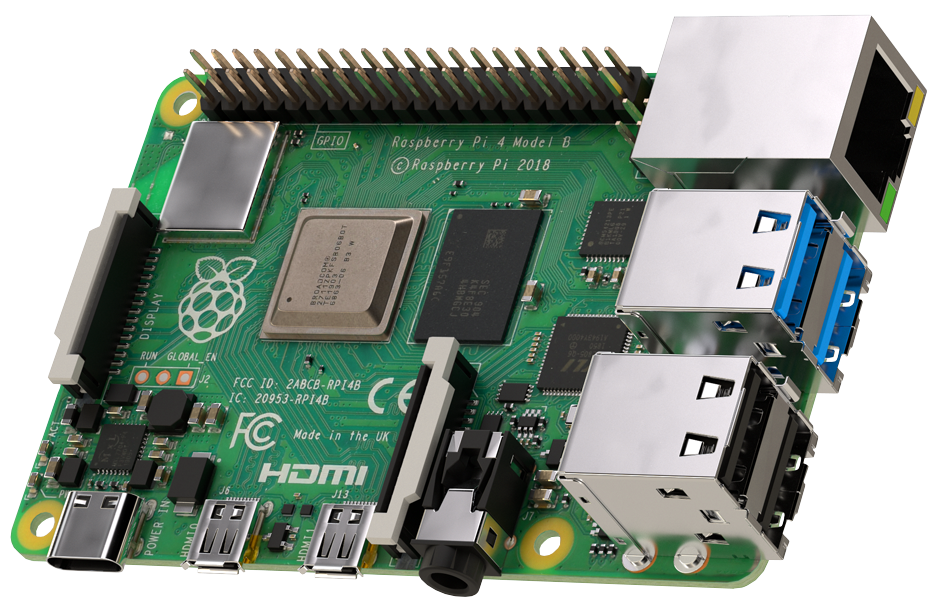
The brand is a pioneer in the development of minicomputers, and is well known to programmers. The name of the company is translated from English as "raspberry", so many users call the mini-computer the affectionate word "raspberry". The combination "Pi" indicates that the original programming language in which the code for the device was written was Python. The 4th modification is an improved continuation of the previous version. The device is most often purchased for the purpose of creating a server for a smart home, a media center, a process controller, and also for developing applications. All necessary interfaces for operation are pre-installed at the factory (Wi-Fi, Bluetooth, Ethernet).
Unlike cheaper competitor offerings, there is HDMI 2.0 support, which allows you to use the card to output images to a TV directly (you must purchase the appropriate cable before connecting the device). It is possible to work with two monitors at the same time. The basis of the system is single-chip, it consists of a Cortex-A72 processor (the number of cores is 4) and a VideoCore VI GPU. The manufacturer claims that the new product is 50% more productive than the previous modification. The line of models includes several varieties that differ from each other in the amount of RAM. Compared to the previous modification, the structural layout of the components on the board has changed.
According to buyers, a mini-PC is able to cope with most of the tasks that the user performs on a daily basis - surfing the web, processing text files, working with music and video. The GPIO pinout for 40 pins corresponds to the previous modification, and allows you to connect a large number of external equipment. There is an audio and video output.
The product is delivered in a cardboard package, inside which there is a board, an instruction manual, as well as a memo with tips and recommendations for setting up. According to buyers, this model is "hotter" than the previous ones, so it would be useful to purchase additional cooling if intensive work is expected. For those who do not like air cooling, we can recommend getting a metal case that dissipates heat. You will also need to purchase a power supply separately. The average price of a modification for 4 GB is 5,800 rubles, for 8 GB - 8,900.
Specifications:
| Index | Meaning |
|---|---|
| CPU | ARM Cortex A72 |
| Clock frequency | 1.5 GHz |
| Flash memory | 8 GB |
| USB | 3.0 |
| WiFi | 802.11b/g/n/ac |
| Rated operating voltage | 5 V |
| Bluetooth | v5.0 with BLE |
| frequency range | 2.4 / 5 GHz |
| Digital audio/video output | 2× micro-HDMI version 2.0 |
| Analog audio/video output | 4 pin 3.5mm mini jack |
| Memory card | microSD |
| GPIO I/O Ports | 40 |
| dimensions | 85×56×17 |
- wide functionality;
- there is HDMI;
- mini PC is in the TOP of the best for your money;
- the most popular single-board minicomputer model, sold in all specialized stores.
- for active use, you need to purchase additional cooling (the power cable is also not supplied with the product).
ASUS Tinker Board S
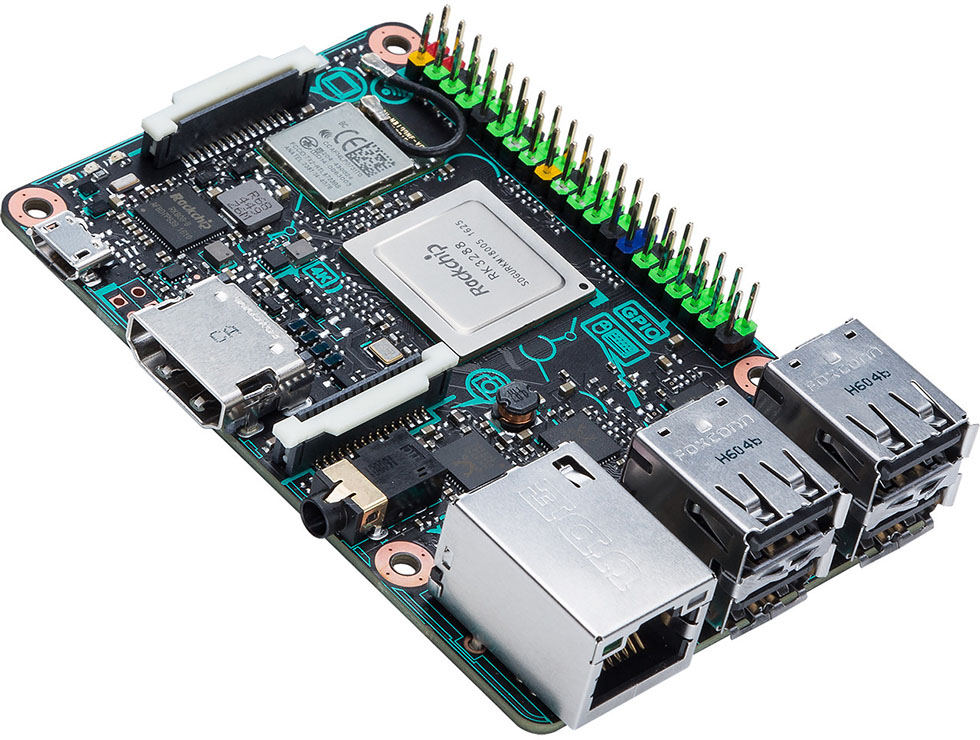
The rating continues with a direct competitor to the previous applicant from the well-known developer of computer technology ASUS. The popularity of the model began from the moment it was launched on the market in 2018. The device is powered by a Rockchip RK3288 quad-core processor. There is a built-in eMMC storage that holds 16GB. There is a microSD card slot. Of the features, one can single out the presence of a low-voltage input, which eliminates the problems that arise during power outages.
Since mini-PCs are often purchased to work with a TV, this model has an HDMI module. It is capable of executing commands given from the remote control. The developers have improved the I2S output by improving the Slave mode and modernizing the API.
The graphics core of the Mali T760 MP4 is "sharpened" for working with multimedia, and performs the assigned functions without any complaints, whether it's a home theater or a sound studio, a graphic editor. There is a built-in HD Audio codec that allows you to process streams up to 192 kHz / 24 bits. The 40-pin GPIO allows you to connect various sensors, buttons, LEDs, and other interaction tools to your mini PC. There is built-in Wi-Fi and Bluetooth with protection against radio frequency interference. The average price of a product is 7,900 rubles.
Specifications:
| Index | Meaning |
|---|---|
| CPU | Rockchip Quad-Core RK3288 |
| Clock frequency | 1.8GHz |
| Graphic arts | ARM Mali T764 |
| RAM memory | 2GB 2ch LPDDR3 |
| USB | 2.0 |
| WiFi | 2.4GHz 802.11b/g/n |
| Audio | RTL codec ALC4040 |
| Bluetooth | 4.0+EDR |
| LAN | RTL GB LAN |
| Analog audio/video output | 3.5mm audio jack |
| Memory card | microSD |
| GPIO I/O Ports | 40 |
| dimensions | 8.55×5.4 cm |
- wide functionality;
- there is an HDMI port;
- quality assembly.
- not detected.
Odroid-XU4
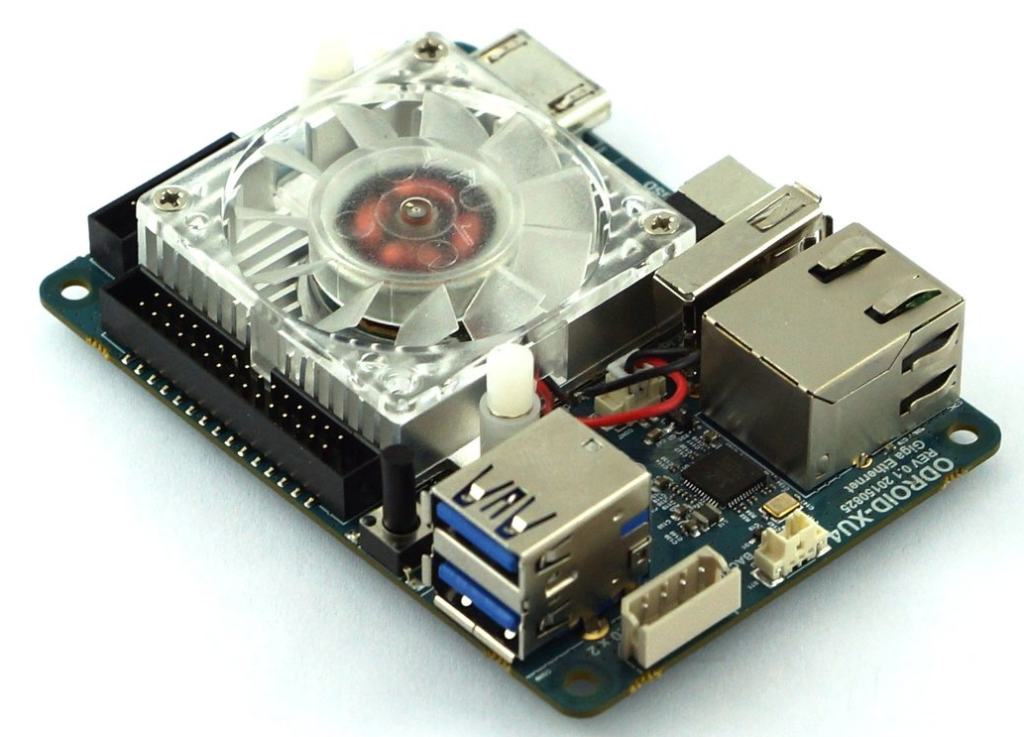
The model is a modified modification of the previous generation, which runs on Linux (Ubuntu, Android 4.4, Lollipop). The package includes a single-board device, as well as a power supply (which is rare in such devices). Other features include the presence of a full-fledged cooler, which is also rare. Despite the fact that it creates a certain level of noise, the cooling of the heated parts is more efficient than in devices from other manufacturers. The model is the flagship in the product line of the Korean company.
High performance is ensured by the eight-core Samsung processor. Also built-in is 2 GB of LPDDR3 memory, a microcard slot (maximum capacity is 64 GB), USB 3.0 and HDMI Type A connectors, 42-pin GPIO. There is also a Gigabit Ethernet network controller. There is no internal memory. In addition to the board, the manufacturer offers the purchase of other components: case, modules, adapters, and other equipment. Also for sale is the CloudShell 2 complex, which has a built-in display, battery and modules for attaching hard drives. The average price of a product is 6,500 rubles.
Specifications:
| Index | Meaning |
|---|---|
| CPU | Samsung Exynos5 Octa ARM Cortex-A15 Quad 2Ghz and Cortex-A7 Quad 1.3GHz CPUs |
| Clock frequency | 2 and 1.3 GHz |
| Graphic arts | Mali-T628 MP6 |
| Flash memory capacity | up to 64 GB |
| USB | 3.0 |
| WiFi | 802.11b/g/n |
| Audio | HDMI Digital audio output |
| Bluetooth | No |
| LAN | Ethernet LAN 10/100/1000Mbps |
| Food | 5 V |
| Memory card | microSD |
| GPIO I/O Ports | 42 |
| dimensions | 94 x 70 x 18mm |
- there is a built-in cooler;
- eight-core processor;
- good value for money;
- the manufacturer produces a large number of additional components;
- the power supply is included in the package.
- the cooler creates noise during operation.
Premium (over 10 thousand rubles)
NVIDIA Jetson Nano Developer Kit
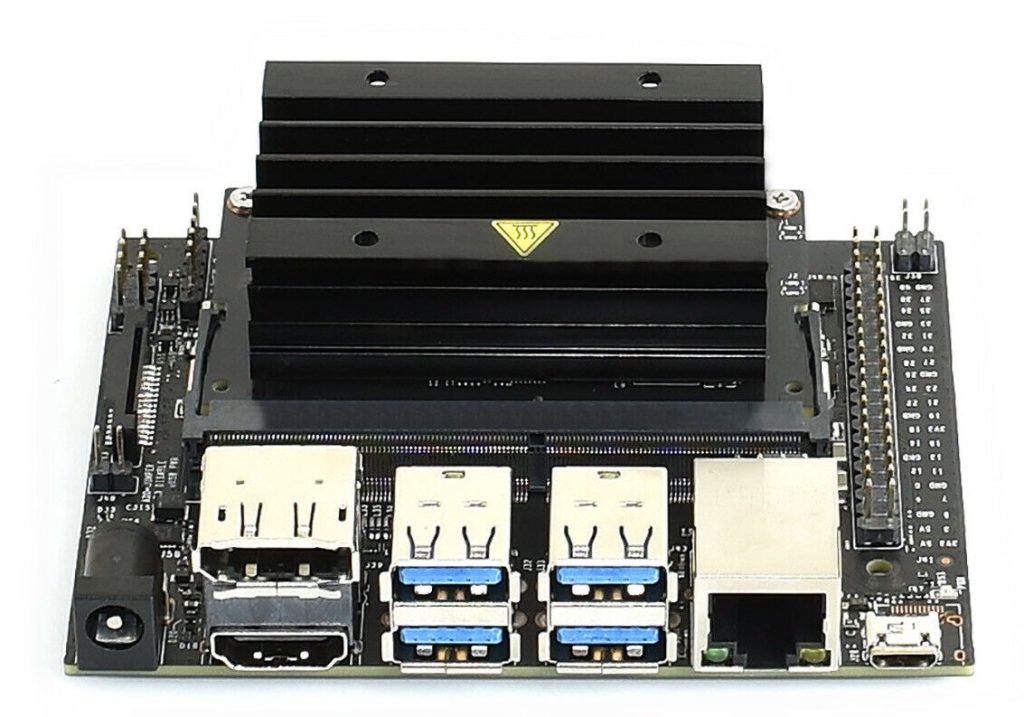
The model entered the market in 2019. The system operates on the basis of a 4-core processor with the function of launching tasks focused on the GPU. The device is compatible with the "raspberry", has 40 pins, and a built-in connector for connecting the camera. Most components that are compatible with the Raspberry Pi will be able to pair with NVIDIA. There are basic built-in modules - 2 video connectors, USB 3.0, Gigabit-Ethernet, while there is no WiFi.
The device is sold assembled, consists of two main components - the board itself and the branded module. This type of arrangement allows them to be separated and operated separately from each other. Unlike the Raspberry Pi, which does not have a graphics accelerator, the technical capabilities are provided here in order to solve graphics tasks. The developer has implemented the possibility of machine learning here, which requires a certain technical resource.
The Linux operating system is written to the media, and includes the Python programming language, as well as OpenCV. There is a full-fledged radiator for cooling. In general, NVIDIA positions its product as the best for creating artificial intelligence and using it in robotics. On the Internet you can find a large number of instructions describing systems created on the basis of a single-payer. The average price of a product is 12,900 rubles.
Specifications:
| Index | Meaning |
|---|---|
| CPU | ARM Cortex A57 |
| Clock frequency | 1.43 GHz |
| Graphic arts | NVIDIA Maxwell |
| RAM memory | 4 GB LPDDR4 |
| USB | 3.0 |
| WiFi | No |
| Operating system | not installed |
| Bluetooth | No |
| LAN | LAN 1000 Mbps |
| Video | HDMI 2.0 |
| Memory card | microSD |
| GPIO I/O Ports | 40 |
| dimensions | 100x29x80 mm |
- universal use;
- one of the best manufacturers of computer equipment that cares about its reputation and does not allow marriage;
- due to the popularity of the model, buyers do not have difficulties with where to buy the device;
- there is a radiator.
- there is no WiFi and Bluetooth module;
- some buyers complain about how much the device costs and claim that for such a price you can buy a more functional Chinese counterpart.
Khadas VIM2
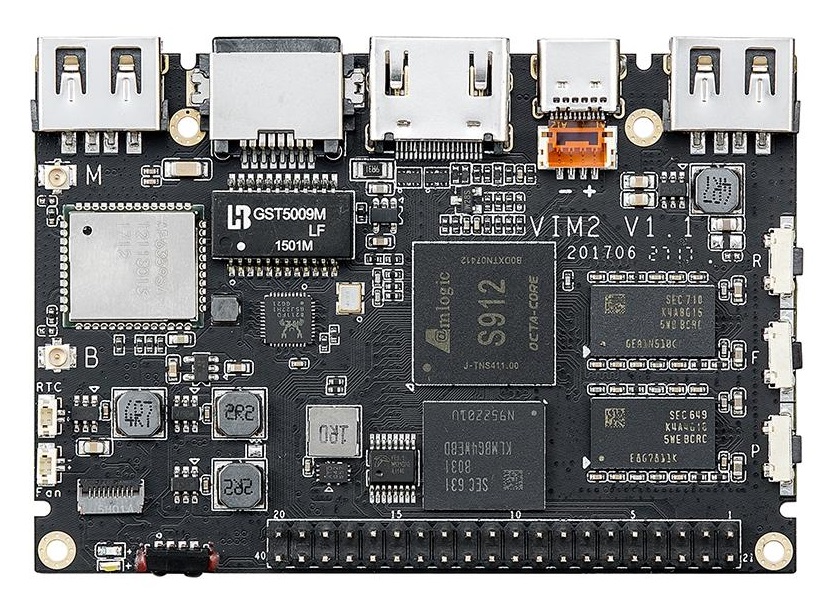
The model has been on the market for several years, and you can find a large number of reviews on it on the net. Modification of the second generation differs from its predecessor in increased memory capacity, as well as a more powerful processor. The device runs on one of two operating systems - Linux and Android. Amlogic S912 8-core processor allows you to perform a large number of typical tasks. The developers also finalized the graphics accelerator, and raised the RAM standard to class 4.
There are 3 types of boards on sale - Basic, Pro and Max, while the Max version is one of the most powerful of those that are on sale. Only the mini PC and charging cable are included with the device. There is also a short description of the main characteristics of the device. In the device, all connectors are grouped on one side, so even in the photo the device looks aesthetically pleasing compared to competitors, which are a box with wires sticking out in different directions. External devices can be connected not only via GPIO, but also via the so-called pogo pins.
Among the shortcomings, users note the small dimensions of the device, which is why it is impossible to install a full-fledged radiator on it, and small coolers do not have the required efficiency. The average price of a product is 10 thousand or more rubles.
Specifications:
| Index | Meaning |
|---|---|
| CPU | Amlogic S912 |
| Clock frequency | 1.5 GHz |
| Graphic arts | ARM Mali-T820MP3 |
| RAM memory | 3 GB DDR4 |
| USB | 2.0 |
| WiFi | 802.11a/b/g/n/ac |
| Operating system | Linux and Android |
| Bluetooth | v4.2 |
| LAN | LAN 1000 Mbps |
| Video | HDMI 2.0a (up to Hz) |
| Memory card | microSD |
| GPIO I/O Ports | 40 |
| Food | 5 V |
| dimensions | 82x58x11.5mm |
- high performance;
- a large number of interfaces;
- there are 3 versions on sale, the user can choose any one according to his selection criteria.
- there is no free space for a full-fledged cooler.
Udoo x86
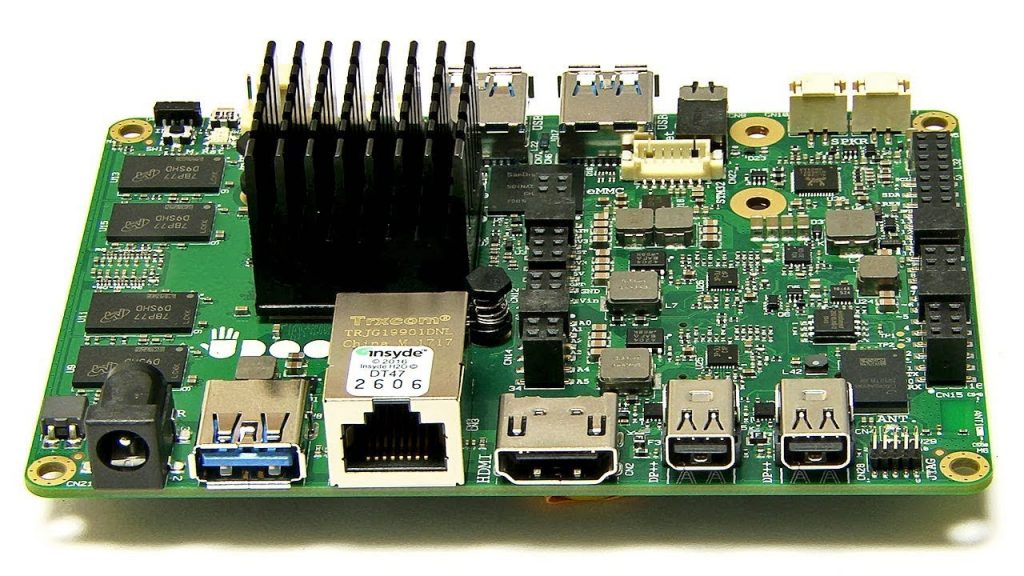
Many, before choosing a mini-PC, are interested in the architecture on which it is built. In the model under consideration, this can be recognized immediately from its name - x86. On sale you can find 4 versions that differ from each other in power, amount of RAM, as well as the presence of a built-in disk. Most often they buy two varieties: Ultra and Advanced Plus. The first version has a quad-core Pentium N3710 chip, the second version has a Celeron N3160 with the same number of cores.
Cooling in both modifications is passive. The amount of RAM is different - the Ultra version has 8 GB "on board", and the Advanced Plus version has 4 GB. To increase the memory capacity, an eMMC module is used, as well as a microSD card. Of the advantages of micro-PCs, users highlight the presence of HDMI 1.4, as well as S / PDIF interfaces. The audio jack is standard. The device can work not only on Linux, but also on Windows or Android.There are no wireless interfaces, but it is possible to connect Wi-fi through an adapter. The average price of the younger version starts from 13 thousand rubles.
Specifications (Ultra version):
| Index | Meaning |
|---|---|
| CPU | Intel Pentium N3710 Braswell |
| Clock frequency | 2.56 GHz |
| Graphic arts | Intel HD Graphics 405 to 700 MHz |
| Flash memory | 8 GB |
| USB | 3.0 |
| WiFi | missing |
| Video interfaces | HDMI 1.4 up to 4K @ 30Hz |
| Bluetooth | missing |
| Net | gigabit ethernet |
| Audio | mic/headphone combo jack, internal speaker jack, S/PDIF output |
| Serial ports | 2x UART ports |
| IR port | there is |
| Food | 12 V / 3 A |
| dimensions | 120 x 85 mm |
- high power;
- a large number of positive customer reviews;
- compact dimensions;
- There is passive cooling.
- high price;
- there are no wireless interfaces, you need to buy additional equipment to establish a connection.
Conclusion
Many computer enthusiasts are not even aware of the existence of single-board minicomputers, or have a vague idea of what it is. Experienced users believe that such technology is the future, since it combines not only compact dimensions, but also wide functionality. Due to the fact that all the necessary equipment is placed in a small case, mini-PCs are able to perform many useful tasks, such as creating a "smart home", a media center, a server (network, mining). Combined with the low cost of most modifications, the multitasking of minicomputers has made such devices popular with programmers and electronics enthusiasts.
When choosing a microcomputer of which company is better to buy, you should focus primarily on the reviews of real users. It is recommended to look for such reviews on specialized forums, or on sites where independent opinions are published. We do not recommend purchasing Russian-made devices, as their quality leaves much to be desired. The best choice would be to order a device on a popular Chinese site, after reading the reviews about the seller and the product being sold. This will help not only to save money, but also to purchase a device of acceptable quality, which is not inferior to famous brands. We hope that our review will help you make the right choice!
new entries
Categories
Useful
Popular Articles
-

Top ranking of the best and cheapest scooters up to 50cc in 2022
Views: 131656 -

Rating of the best soundproofing materials for an apartment in 2022
Views: 127697 -

Rating of cheap analogues of expensive medicines for flu and colds for 2022
Views: 124524 -

The best men's sneakers in 2022
Views: 124041 -

The Best Complex Vitamins in 2022
Views: 121945 -

Top ranking of the best smartwatches 2022 - price-quality ratio
Views: 114983 -

The best paint for gray hair - top rating 2022
Views: 113400 -

Ranking of the best wood paints for interior work in 2022
Views: 110326 -

Rating of the best spinning reels in 2022
Views: 105334 -

Ranking of the best sex dolls for men for 2022
Views: 104372 -

Ranking of the best action cameras from China in 2022
Views: 102221 -

The most effective calcium preparations for adults and children in 2022
Views: 102015
